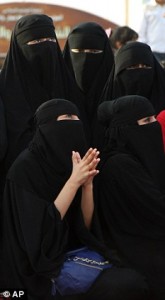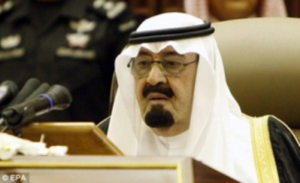 King Abdullah of Saudi Arabia issued a decree on Sunday granting women the right to vote and run in local elections. He also announced that, for the first time, women will be appointed to the Majlis Al-Shura, the kingdom’s de facto (rubber-stamp) parliament.
King Abdullah of Saudi Arabia issued a decree on Sunday granting women the right to vote and run in local elections. He also announced that, for the first time, women will be appointed to the Majlis Al-Shura, the kingdom’s de facto (rubber-stamp) parliament.
But Western pundits, across the political spectrum, are scoffing. They note, quite fairly, that women still do not have the basic right to drive or travel without the permission of a male guardian.
To be sure, this decree will have about as much impact on the religious (sharia) strictures that subjugate Saudi women as the drop of a pebble in the Red Sea. But that’s the point.
For I submit that it actually represents as much of a tipping point in the struggle for civil rights for women in Saudi Arabia as the Voting Rights Act of 1965 represented for blacks in America.
Obviously, it’s all too belated and far too circumscribed. But when blacks got the right to vote it was even more belated and circumscribed. Indeed, for many years, Jim Crow laws made it virtually impossible for them to exercise that right.
Of course, any criticism of Saudi Arabia must be viewed through the prism of the crack-like dependency Western democracies have on its oil exports: It was feasible to mount an international boycott against the Apartheid regime of South Africa because it had nothing Westerners needed. It is not feasible to do so against the kingdom of Saudi Arabia because it has the fuel Westerners depend on to fuel their privileged lifestyles.
 This is why, despite the high-minded criticisms of Western pundits, Western governments will welcome and abide every baby step Saudi Arabia takes on the path towards democracy.
This is why, despite the high-minded criticisms of Western pundits, Western governments will welcome and abide every baby step Saudi Arabia takes on the path towards democracy.
Meanwhile, there’s no denying that the king’s decree is part of a calculated plan to forestall the kind of restiveness among Saudis that has led to the downfall of dictators in other countries throughout the Arab Spring. He announced $93 billion in employment and other welfare benefits in April.
Abdullah’s only concern is striking the right balance between managing his people’s growing hunger for democratic freedoms and staying true to the religious dictates of his kingdom’s (Wahabist) interpretation of Islam. After all, in far too many cases, these dictates preclude those freedoms.